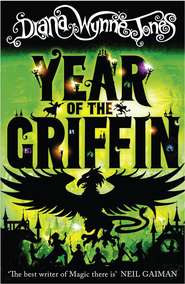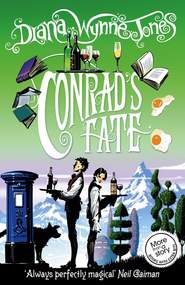По всем вопросам обращайтесь на: info@litportal.ru
(©) 2003-2024.
✖
Diana Wynne Jones’s Magic and Myths Collection
Настройки чтения
Размер шрифта
Высота строк
Поля
“Yes, he put a curse on his collar,” said Adara. “Stones.”
“Ah!” said the Dorig boy. “I thought he must have done something. He wasn’t much of a fighter, but he was very clever. What was the curse?”
“Stones,” said Adara, and hesitated. She dared not repeat the words of the curse, well though she remembered them, for fear of bringing it on herself. She had to pick her way, telling it haltingly in her own words, through the pattern of the collar and the pattern of disaster woven into it, until she reached the owls’ heads at either end. “Then he said the birds’ faces were to – er – watch and make sure the one who has the collar will – not be able to let it go even though – er – it costs him the everything he’s got. Stones,” she concluded, thankful to have got it over.
The small Dorig beside her frowned. “But didn’t he name any Powers? I thought—”
“Oh yes, stones,” said Adara. “But not ones I know, and not until Orban tried to take the collar off him.”
“What Powers? Sun, Moon—?”
“No, no. Stones,” said Adara. There seemed to be no way of mentioning the Powers without naming them. Adara dropped her voice and crossed the fingers of both hands, with her thumbs under that for added protection. “The Old Power, the Middle and the New,” she whispered.
“Oh.” The Dorig boy looked very awed and also very satisfied. “That’s all right then. Nothing will stop the curse working now.”
“Unless the Powers are appeased,” Adara said. “Can’t I try and appease them? It was my fault.”
“I don’t think so. Not all Three.”
“Well, I swear to try,” said Adara.
The Dorig boy seemed a little troubled by her decision. “But I don’t want you to.” He thought a moment. “What’s your name?” he asked.
Adara simply looked at him. She knew well enough that you did not trust strangers with your name. And the worst of it was that she had already made him a present of Orban’s.
“It’s all right,” he said irritably. “I quite like you. And I only asked so that I shouldn’t swear to kill you by mistake. Mine’s Hathil – truly. Now what’s yours?”
Adara looked into his yellow-brown eyes and thought he was telling the truth. Having glanced at his hands, in case his fingers were crossed, and found them straight, she said, “Adara.”
“Thanks,” said Hathil. “Now I can swear. You can swear to lift the curse if you want. I swear to revenge my brother by helping the curse in every way I can. I shall spill every drop of Orban’s blood, except Adara’s, and dedicate it to the Powers. I call on them not to be placated until none of Orban’s people are left alive on the Moor. May the hidden stones bear witness, and the Sun, Moon and Earth.”
Adara listened dejectedly. She did not deny Hathil had the right to swear, but it did not seem fair on all the other people who had done him no harm. When he finished, she said, “Don’t you think you’re rather young to swear all that?”
“Blame your brother,” Hathil said stiffly. “He’s a murdering brute.” Adara sighed. “And I liked H—my brother,” Hathil explained. “He was clever, and he told me all sorts of things. I was going to go exploring when I grew up, and now I can’t because they’re going to make me King instead. They won’t let me out of their sight most of the time now. But the one good thing I can see about being King is that I can order everyone to fight Orban. And I’m not too young to swear. Do you see those stones?” He jabbed his pale finger down at the old road. Adara looked through at the cracked old stones in some perplexity. Though they had figured largely in the conversation, she could not see quite what bearing they had on Hathil’s age. “The Giants who made this road,” said Hathil, “were almost destroyed by a Giant who swore to stamp them out when he was not much older than I am.”
Adara was impressed. “How do you know that?”
“I learnt it,” said Hathil. “It pays to learn things.”
Adara, in spite of her dejection, felt Hathil was right. Perhaps, if she learnt and learnt, she might find a way of lifting that curse before it destroyed Orban, and before Hathil was old enough to carry out his oath. “I think,” she said, “you’ll make an awfully good King.” Hathil looked at her suspiciously. “You seem to know so well what you’re going to do,” Adara explained.
“Oh, that,” said Hathil. “Yes, I do.”
After that Adara went home greatly comforted and worked hard to learn as much as she could. She grew up famous for her wisdom. Orban, on the other hand, grew steadily more unlucky. He broke his leg twice. When he was fourteen, he accidentally killed his best friend. When he was eighteen and had grown into a sulky young man with scraggly red hair, he fell in love with the most unpleasant woman on the Moor. Her name was Kasta. Many people thought it was the greatest misfortune yet, when Kasta married Orban. They had several children, but none lived to be a year old.
The bad luck spread from Orban to the rest of Otmound. Sheep died, hunting was bad and other food scarce. Otmound got steadily poorer. Outside, Dorig roamed in increasing numbers, and grew bolder and bolder. Otmounders soon dared not go out alone for fear of being pulled under water.
The bad luck spread from Otmound to the other mounds. There was fire in Beckhill and flooding in Islaw. And as Adara, for all her learning, could not learn how to lift the curse, it went on spreading, so that long before Ayna, Ceri and Gair were born, even the Giants were affected.
CHAPTER TWO (#ulink_a1b76796-1914-5e72-941c-c021c4ebdcf1)
Ayna, Gair and Ceri were born in Garholt. Their father was Gest, who was a hero. This is how Gest became famous.
Garholt was on the south of the Moor, not far from the other end of the old Giants’ road. It was the largest of all the mounds and by far the most prosperous. While Chanters and Wise Women all over the Moor were shaking their heads and wondering what could be causing the growing bad luck, for many years the curse seemed to pass Garholt by.
Garholters – rather unwisely – prided themselves on their luck. They had gold, wool and hides in plenty; salt, fuel and wine. Their sheep were more numerous and in better shape than any on the Moor. Their honey was famous. Indoors, the houses were roofed with stone, and the five wells, round and stone-roofed like the houses, had been made safe from Dorig and from every other danger. The walls of the mound, below the big windows, were hung with tapestries embroidered in dark, bright colours. And Garholt could, in a quarter of an hour, muster more than a hundred of the fiercest and best-armed fighting-men on the Moor – not to speak of equally warlike women and children.
But this took a good, careful Chief to maintain it. Gart, the old Chief, was just such a one. But he died quite suddenly, and his two sons were killed the same night. Hearing their father had been taken ill, Gart’s two sons were hurrying home from hunting, using one of the new Giants’ roads for speed. This was unwise of them. As the curse had affected the Giants too, they had grown fewer, but those few had become very violent and untrustworthy. While Gart’s sons were hurrying along the road, a Giant caught and crushed them. So, as Miri the Beekeeper’s wife, who was a Wise Woman, pointed out, the bad luck came to Garholt after all and left it without a Chief.
That was how Gest came to be Chief in Garholt. He was old Gart’s nephew and lived in the much smaller mound of Islaw. Messages were sent to Gest at once, but the Garholters were very much afraid he would not be the good, careful Chief they were used to. Islaw people had a name for being queer and shifty – though, of course, no one in Garholt would have dreamt of calling them half-Dorig the way the Otmounders did. Still, Islaw people were known to be different. And Gest’s Islaw father had been a Chanter, who were odd people at the best of times. Then it was learnt that Gest was bringing his own Chanter, a man called Banot, with him. From being dubious, the Garholters became indignant. Weren’t the Garholt Chanters good enough for Gest? Or what?
When Gest arrived, everyone was relieved to find him fair, handsome, jolly and not at all peculiar. He was a big man, as a Chief should be, and obviously a seasoned fighter. Nor did he seem particularly clever. The Chanter, Banot, though his thin face had the dreamy look of his profession, seemed to have no harm in him either. It soon became clear that Gest had brought him simply because he and Banot were bosom friends. The Garholters all heaved sighs of relief and began to manoeuvre Gest into marrying Tille, the granddaughter of old Gart.
Nothing came of that. Gest was nice to Tille – as he was to everyone – but it was Banot who fell in love with Tille and married her.
Gest had not been a month in Garholt, when a messenger arrived from Og of Otmound. Og greeted the new Chief and wanted a band of fighting-men from Garholt at once to help him fight the Dorig. Hearing this, Gest smiled, a wide, jolly smile. Banot, who knew that smile, looked apprehensive. But the older and more responsible Garholters, who did not know it, took Gest aside and gave him the benefit of their advice. They did not know then that Gest was a hero.
“See here,” said the oldest Chanter, “Og has no right to take that tone with you. He may be the senior Chief, but we’ve made no treaty with him. Send me back to say No.”
“He’s giving you orders because he can’t afford to pay for our help,” said the goldsmith. “But we Garholters have our pride.” He looked round, with satisfaction, at the gold glimmering on people’s necks and wrists.
“I’ll say No very tactfully,” said the Chanter.
“Why is he so set on fighting the Dorig?” Gest asked.
“It’s the natural order of things,” Miri, the Beekeeper’s wife, told him. “Men against Dorig, Giants against men.”
“They say the only good Dorig is a dead Dorig,” added the oldest smith.
The Beekeeper, who always had news, said, “The Dorig have been pulling their people and sheep under water for years. A while back, they took to waiting outside Otmound in their own shapes and attacking anyone they met. Og warned everyone who went outside to carry a thornbush against them, but Dorig don’t seem to be afraid of thorns the way they used to be. Their latest trick is to pretend to be game when the Otmounders are out hunting: let a man chase them, then shift to their true shape and kill him. You know their crafty ways.”
“Well, no,” Gest said apologetically. “I’ve only met a Dorig once and it ran away before I could speak to it.”
“Then you have a lot to learn,” said the smith.
Gest smiled again. “I know I have. That’s why I think I’d better go over the Moor and talk to Og.”
To the consternation of all Garholt, this is just what Gest did. He sent Og’s messenger back to say he was coming and then prepared to set out himself, with only Banot for company. Everyone implored him to consider. They reminded him there was no one to be Chief after him. They said, if he must go, he should take twenty good men with him to protect him from Dorig. They told him fearsome tales about the way the Dorig sacrificed their victims and hung them up to the Sun.
Gest attended to none of it. He was quite pleasant, but completely firm. The Garholters discovered that their new Chief was the most obstinate man on the Moor. They respected him greatly for that, but it made them all the more anxious to have him safe back again. They took Banot aside and made him promise to see Gest was safe.
“I’ll do what I can,” said Banot. “But you don’t know Gest.”
They had to be content with that. Everyone anxiously watched the two set off along the line of the old road. The early Sun glinting on the gold collar of each was the only bright thing about them. Their clothes and weapons were dull and serviceable. Banot’s harp was shut in a dingy travelling case, so that it would not catch the attention of Giants. When the two had disappeared into the mists, the Garholters retired to the mound and spoke words for their safety. Then they waited.
Two days later, to their dismay, Banot came back alone. He was vague-eyed and abstracted, and Tille was the only one who was wholeheartedly glad to see him. The rest crowded round him, demanding to know where Gest was.
“In Otmound, I suppose,” Banot said vaguely. “He sent me home.”











